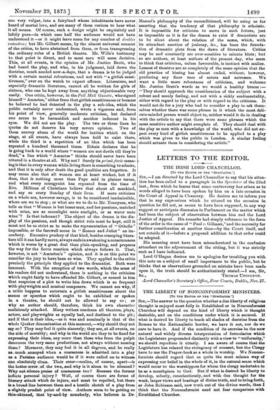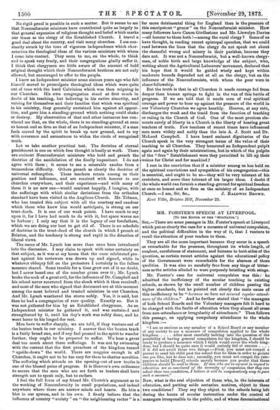THE LIBERTY OF NONCONFORMIST MINISTERS. [TO THE EDITOR OF TIM
"SPECTATOR.") SIR,—The answer to the question whether a due liberty of religious thought is enjoyed most fully in Established or in Nonconformist Churches will depend on the kind of liberty which is thought desirable, and on the conditions under which it is secured. If what is desired be liberty to teach all shades of doctrine from the Roman to the Rationalistic border, we have it not, nor do we care to have it. And if the condition of its exercise,be the now natural and widely diverse interpretation of formularies which the Legislature propounded distinctly with a view to "uniformity," we should repudiate it utterly. I am aware of course that the Legislature has relaxed the stringency of consent, but the Clergy have to use the Prayer-book as a whole in worship. We Noncon- formists should regard that as quite the most solemn way of expressing our belief in the whole of it, in the natural sense which would occur to the worshippers for whom the clergy undertake.to be as a mouthpiece to God. But if what is desired be liberty to develop, soberly, conscientiously, and with dae thought for the weak, larger views and bearings of divine truth, and to bring forth, as John Robinson said, new truth out of the divine words, then I think that the Nonconformist need not fear comparison with Established Churches. No rigid proof is possible in such a matter. But it seems to me that Nonconformist ministers have contributed quite as largely to that general expansion of religious thought and belief which marks our times as the clergy of the Established Church. I travel a good deal about the country, and visit many churches. I am con- stantly struck by the tone of vigorous independence which char- acterises the theological ideas of the various ministers with whom I come into contact. They seem to me, on the whole, to think and to speak very freely, and their congregations gladly suffer it. I think that clergymen are little aware of the amount of bold original thought which their Nonconformist brethren are not only allowed, but encouraged to offer to the people.
I knew an Independent minister some sixteen years ago who felt himself moved to promulgate theological ideas which were quite out of tune with the hard Calvinism which was then reigning in our Churches. His own congregation stood at first much in doubt of his teaching, but believing in his entire sincerity, and valuing for themselves and their families that which was spiritual in his ministry, they generally sustained him against all opposi- tion, and gave him a standing-ground which nothing could shake or destroy. My observation of that and other instances has con- vinced me that, on the whole, there is no standing-ground at once so honest and so firm as that of an Independent minister, if a man feels moved by the spirit to break up new ground, and to try with reverence and earnestness to widen the circle of recognised truth.
Let us take another practical test. The doctrine of eternal punishment is one on which free thought is busily at work. There are eminent Nonconformist ministers who hold and preach the doctrine of the annihilation of the finally impenitent. I do not agree with them ; it seems to me a miserable exodus from a tremendous difficulty. Others preach as clearly the doctrine of universal redemption. These teachers retain among us their position and influence, and are received with honour in our churches everywhere, and their experience—and with many of them it is no new one—would contrast happily, I imagine, with the sufferings with which similar deviations from the orthodox standard have been visited in the Anglican Church. Mr. Tidman, who has treated this subject with all the courtesy and candour which those who knew him would anticipate, is strong on our trust-deeds. It is one of our weak points. I have much to say upon it, for 1 have had much to do with it, but space warns me to forbear ; I only say that it is the legacy of our forefathers, which we are doing our best to get rid of. There is no schedule of doctrine in the trust-deed of the church in which I preach at Brixton, and the tendency is strong and rapid in the direction of liberal views.
The name of Mr. Lynch has more than once been introduced into the discussion. I may claim to speak with some certainty on that subject, as it was at my house that the once celebrated pro- test against his reviewers was drawn up and signed, while in whatever obloquy fell on the protesters I certainly in the fullest measure shared. Some trouble for a time grew out of it no doubt, but I never heard one of the number groan over it ; Mr. Lynch broke the neck of a great evil, for the influence of Dr. Campbell and his school never recovered from the shock which it then received ; and most of the men who signed that document are at this moment among the most beloved and trusted ministers in our Churches. And Mr. Lynch weathered the storm nobly. Yes, it is said, but then he had a congregation of rare quality. Exactly so. But it was not gathered for him by an Established clergyman. As an Independent minister he gathered it, and was sustained and strengthened by it, until his day's work was nobly done, and he went home to his longed-for rest.
Men have to suffer sharply, we are told, if they venture out of the beaten track in our ministry. I answer that the beaten track is a fairly broad one, and if any feel pressed in the spirit to wander further, they ought to be prepared to suffer. We hear a great deal too much about these sufferings. It was not by swimming with the current that the first preachers of the kingdom turned " upside-down" the world. There are magpies enough in all Churches, it ought not to be too easy for them to chatter novelties. The suffering which attends on the opening-out of new truths is one of the blessed pains of progress. It is Heaven's own ordinance to secure that the men who are set forth as leaders shall have strength not to speak only, but to endure.
I feel the full force of my friend Mr. Church's argument as to the working of Nonconformity in small populations, and indeed anywhere where there are narrow minds and hearts. He hits a blot in our system, and in his own. I firmly believe that the influence of country " society " on " the neighbouring rector " is a
far more detrimental thing for England than is the pressure of this omnipotent "grocer" on the Nonconformist minister. How many followers have Canon Girdlestone and Mr. Llewelyn Davies —all honour to them both !—among the rural clergy ? Some of us have thought, in reading recent episcopal speeches, that we could read between the lines that the clergy do not speak out about the shameful wrong and misery in their parishes, because they dare not. It was not a Nonconformist, but a well-known clergy- man, of noble birth and large knowledge of the subject, who, writing about the Agricultural Labourers' movement, declared that his hope that it would be guided wisely and kept within moderate bounds depended not at all on the clergy, but on the influence of the Nonconformists, with whom the poor were in closer fellowship.
But the truth is that in all Churches it needs courage fed from deeper than human springs to fight in the van of this battle of progress. If we are told that it needs men of real spiritual courage and power to bear up against the pressure of the world in our Voluntary Churches we agree heartily. Heaven, at any rate, discharges the weak and the timid from the function of teaching or ruling in the Church of God. One of the most precious ele- ments surely of liberty in a Church is the liberty of hearing great teachers of truth. Few teachers of recent times have influenced men more widely and nobly than the late A. J. Scott and Dr. McLeod Campbell. I have heard eminent dignitaries of the Church speak in the very strongest terms of the value of their teaching to all Churches. They honoured an Independent pulpit again and again by their ministrations, but in which of the pulpits of the "free" Establishment were they permitted to lift up their voices for Christ and for mankind ?
I rest in the conviction that if a minister among us has hold on the spiritual convictions and sympathies of his congregation—this is essential, and ought to be so—they will be very tolerant of his crotchets, and more than tolerant of his larger ideas. I doubt if the whole world can furnish a standing-ground for spiritual freedom at once so honest and so firm as the ministry of an Independent







































 Previous page
Previous page